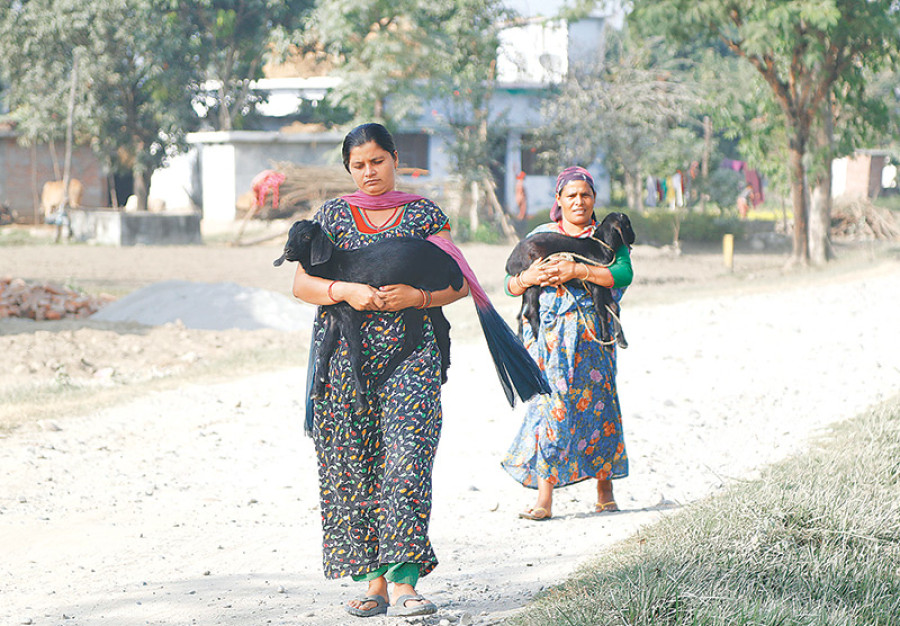National
Dodhara-Chandani asks for jobs, development projects
Voters of Mahakali Municipality, traditionally known Dodhara-Chandani, in Kanchanpur district say they will vote for those who create jobs and carry out development works.
Kamal Dev Bhattarai
Voters of Mahakali Municipality, traditionally known Dodhara-Chandani, in Kanchanpur district say they will vote for those who create jobs and carry out development works.
This municipality falls under Kanchanpur constituency-3 from where Nepali Congress leader Ramesh Lekhak and left alliance candidate Deepak Prakash Bhatta are contesting for the federal parliament seat.
The least developed municipality is in focus of the two forces’ election campaign. Vehicles still have to take an Indian route to reach the isolated Dodhara-Chandani, sandwiched between Mahakali and Jogbuda rivers. The Dodhara-Chandani suspension bridge is not for vehicles. The municipality, formed by merging the Dodhara and Chandani villages, is dominated by Chhetris, Dalits and Janajatis.
As the parties intensify their campaigns in this area, local people are venting their ire at the lack of employment opportunities in the vicinity. Most of the youths go to Indian cities and the Persian Gulf for work.
“When I met senior citizens, they urged me to create jobs for their sons and girls. When I met young people, they asked me when they will get jobs,” said NC candidate Lekhak. “In terms of development, there has been some progress but resolving the problem of unemployment is a major challenge for us,” he said. Candidates are not offering any clear vision of how they will provide employment. People here are engaged mostly in agriculture. Farmers complain of a lack of market for their produce. In the lack of quarantine facilities, they cannot easily export agricultural products to India.
Local farmers also face the problem of irrigation. According to the Mahakali Treaty, this village should get 350 cusec water from the Sharda Barrage. However, there has not been any progress on construction of the infrastructure.
Three years ago, Nepal and India agreed to initiate the process of building structures for irrigation but there has not been much headway. To attract voters, candidates from both sides are making pledges to undertake the project. “If I’m elected a lawmaker, I will prominently raise this issue in Parliament and government. Only a government of the left alliance can resolve this issue,” said UML candidate Bhatta.
Jayaraj Giri, a local farmer, said: “There is a good potential for agriculture here but without access to market, youths are compelled to go to foreign countries [for work].”
Two decades ago, people here used to urge political leaders to relocate them to other parts of the country. Now the situation has changed after some bridges were built to connect the area to Mahendranagar.
The municipality is still totally dependent on the Indian market for essential supplies. The local residents come to Mahendranagar only for official businesses. The Indian currency is in wide circulation. This isolated municipality has 22,000 voters, which could be decisive for both sides. That is why candidates make it a point to canvass in this village.
The area is regarded as the NC’s traditional vote bank but the CPN-UML and the CPN (Maoist Centre) are building their organisations there. In the recently concluded local level elections, NC mayoral candidate Hansharaj Bhatta became victorious with 4,043 votes while his nearest rival, Nar Singh Chaisir of the UML got 3,586. While the NC seeks to retain its vote, the left alliance is trying to gain popularity.
NC President Sher Bahadur Deuba won the constituency in the first Constituent Assembly election in 2008. In the by-elections, Maoist candidate Harish Thakulla won
the seat. Lekhak emerged victorious during the second CA elections.




 9.6°C Kathmandu
9.6°C Kathmandu














